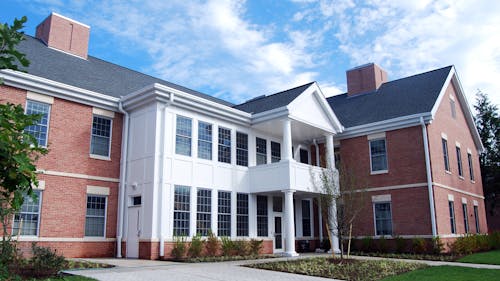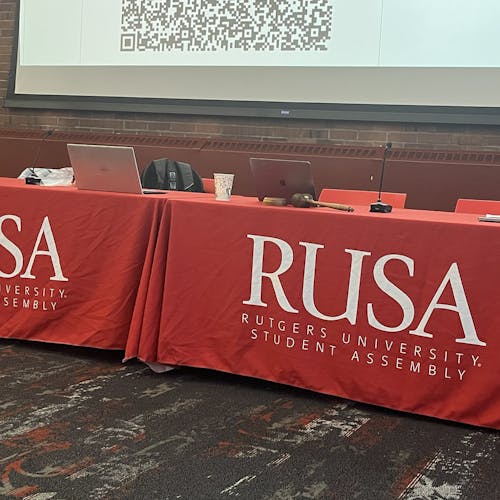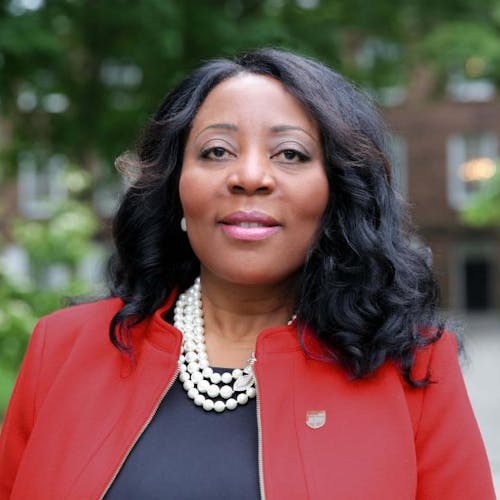RUPD conducts live action drill to prepare for active shooter scenario

The Rutgers University Police Department (RUPD) held a live-action drill last week at the Rutgers University Counseling, Alcohol and Other Drug Assistance Program and Psychiatric Services (CAPS) on the College Avenue campus to prepare faculty in the case of an active shooter on campus.
“The main goal was really to expose employees to some of the sights and sounds that they may experience during an active shooter incident,” said RUPD Lt. Matthew Gulsby.
A similar training session had been conducted several months before it was introduced to faculty, teaching them to run and hide, as well as fight tactics to defend themselves against threats like gunmen, he said. At this event RUPD scheduled a date for some additional training where they planned to include community service officers and volunteers.
“We set up a scenario where we put the employees in their regular working conditions and introduced some training equipment and tried to simulate (a scenario) as best as we could,” Gulsby said.
After the scenario, officers entered the room and discussed how employees reacted and responded, he said.
Drills similar to this one began last year and have been previously held at Alexander Library, John Cotton Dana Library at Rutgers University—Newark, the Rutgers Business School and the Paul Robeson Library on the Rutgers University—Camden campus, Gulsby said.
The number of officers and faculty that attend the drills depends on the size of the venue, he said.
“A lot of what we do is based on feedback from the participants related to some of the things they see and some of the things the observers see,” Gulsby said.
To make the drill more realistic, RUPD tested out the use of noise but it hampered what they intended on accomplishing, so they learned from it, he said.
“It is really kind of based on what the circumstances surrounding the scenario or incident are,” Gulsby said. “Are we confident our officers are trained in active-shooter training? Yes, we are, but again, the response is all predicated on how fast you can get a responder to a scene.”
Officers hope this situation never takes place, but they train and prepare so that they are ready if it does, he said.
“A lot of this training is geared toward the employees and giving the employees an opportunity and experience that they can use anywhere,” Gulsby said.
Tragic events like school shootings seem to be increasingly frequent throughout the country, he said. Proper training and preparedness to deal with situations like this could be the difference between life and death.
Education and preparedness can lead University staff and students to take life-saving steps in the event of a real tragedy either on or off-campus, said Jill Richards, the director of CAPS in an email.
“RUPD explained that part of their role out of this training across the University is to assist participants in developing their knowledge and skill and to assist RUPD in refining their response through active (and) regular drills of this kind,” she said.
Participants in the drill felt that the information and exercises given were useful to them, she said.
“The drill itself lasted very few minutes. The informational session and debriefing with RUPD who led the session lasted roughly an hour,” Richards said.
Data indicates that there is no clear profile of an active shooter, so it is important to hold drills such as this one in a variety of University locations such as libraries, student centers and residence halls, she said.
With so many police officers in one location, the University community may have been concerned if they were not previously alerted that the drill was occurring, Richards said. RUPD will always notify the community in advance so that people know it is only a drill, and are ready to react appropriately in case of a real emergency.
Sofie Diskin, a School of Arts and Sciences sophomore, said she is concerned about guns on school campuses.
“I feel like this has been going on for years and gun control is just a problem around the country in general, particularly in schools and universities. I think it has a lot to do with mental illness,” she said.
There needs to be a better system in place to encourage people with mental illness to get help so tragic incidents can be prevented, Diskin said.
“Lax gun control on campus would put everyone in more danger, including the shooters themselves,” she said.
Diskin said Rutgers should inform more students about the proper procedure and precautionary steps to take in the case of an active shooter on campus.
It is unfortunate that universities have to prepare themselves for crises like school shootings, but it is a precaution that must be taken in this day and age, Diskin said.
“When I heard about the Ohio State shooting in November some concern did arise, because that’s another Big Ten school and it can easily happen,” she said.
Stephen Weiss is a School of Arts and Sciences sophomore majoring in philosophy. He is a correspondent with The Daily Targum.



